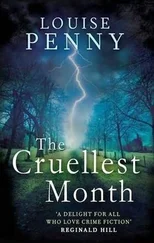“I think we have a lot to talk about, monsieur. Shall we go into the Chapter House? We won’t be disturbed there.”
The door to the room was through the plaque. Gamache knew it. Beauvoir knew it. And the monk seemed to know it. But instead of finding the hidden catch and opening it, Frère Sébastien waited. For one of the others to do it.
Chief Inspector Gamache considered the monk. He seemed pleasant. There was that word again. Inoffensive. Happy in his work, happy in his life. Happy, certainly, to have followed the Angelus bells and found this secluded monastery.
Built almost four hundred years earlier by Dom Clément, to escape the Inquisition. They’d faded into the Canadian wilderness and let the world believe the last rites were said for the last Gilbertine centuries ago.
Even the Church believed they’d gone extinct.
But they hadn’t. For centuries these monks sat by the shores of this pristine lake, adoring God. Praying to him. Singing to him. And living lives of quiet contemplation.
But never forgetting what drove them there.
Fear. Fretting.
As though the walls weren’t high enough, and thick enough, Dom Clément had taken one more measure. He built a room to hide in. The Chapter House. In case.
And tonight the “in case” had finally happened. The Inquisition, in the person of this pleasant monk, had found the Gilbertines.
“ At last ,” Frère Sébastien had said when he first crossed the threshold. “ I found you .”
At last , thought Gamache.
And now the Dominican from the Congregation for the Doctrine of the Faith was asking a police officer to show him the secret door. To open it. To take away the Gilbertines’ last hiding place.
Gamache knew it no longer mattered. The secret was out. There was no more hiding to be done. And no need. The Inquisition had ended. But even so, Chief Inspector Gamache was loath to be the man who after four hundred years opened that door for the hound of the Lord.
All this went through Gamache’s mind in a flash, but before he could say anything, Beauvoir stepped forward and pressed the image of the intertwined wolves.
And the plaque clicked open.
“ Merci ,” said the Dominican. “I wondered briefly if you knew how.”
Beauvoir gave him a dismissive look. That would teach this young monk to underestimate him.
Gamache stepped aside and gestured, inviting the monk to go first. They stepped into the Chapter House and sat on the stone bench that ran around the walls. Gamache waited. He wasn’t going to start the conversation. So the three of them sat in silence. After a minute or so Beauvoir began to fidget slightly.
But the Chief sat absolutely still. Composed.
Then a soft sound came from the monk. It took just a moment for the Chief to recognize it. He was humming the tune Gamache himself had hummed over dinner. But it sounded different. Perhaps, Gamache thought, it was the acoustics of the room. But he knew, deep down, it wasn’t that.
He turned to the man next to him. Frère Sébastien had his eyes closed, his fine, light lashes resting on his pale cheek. And a smile on his face.
It felt as though the stones themselves were singing. It felt as though the monk had coaxed the music out of the air, out of the walls, out of the fabric of his robes. Gamache had the oddest sensation that the music was coming out of himself. As though the music was part of him, and he a part of it.
It felt as though all of everything was broken down and swirled together, and out of that came this sound.
The experience was so intimate, so invasive, it was almost frightening. And would have been, had the music itself not been so beautiful. And calming.
Then the Dominican stopped humming, opened his eyes, and turned to Gamache.
“I’d like to know, Chief Inspector, where you heard that tune.”
TWENTY-NINE
“I need to speak to you, Père Abbot, ” said Frère Antoine.
From inside his office, Dom Philippe heard the request. Or demand. Normally he’d have heard the old iron knocker against wood. But these were far from normal times. The rod had been declared the weapon that had killed Frère Mathieu, and taken away.
And word had spread that the prior had been alive when Simon had found him. Had received last rites, while alive. It gave Dom Philippe immense peace of mind to know that. Though he wondered why Simon hadn’t mentioned it before.
And then he found out.
Mathieu had not only been alive, but he’d spoken. Said one word. To Simon.
Homo.
Dom Philippe was as baffled as anyone by that. With one word left to say in this world, why would Mathieu say “homo”?
He knew what the congregation suspected. That Mathieu was referring to his sexuality. Asking for some sort of forgiveness. Some extreme unction. But the abbot didn’t believe that was true.
Not that Mathieu wasn’t a homosexual. He might well have been. But Dom Philippe had been his confessor for many years, and Mathieu had never mentioned it. It might, of course, have been latent. Deeply buried, and only came roaring to the surface with the blow to his head.
Homo.
Mathieu had cleared his throat, struggled to get the word out, Simon had said, and finally rasped, “Homo.”
The abbot tried it. Clearing his throat. Saying the word.
He repeated it. Over and over.
Until he thought he had it. What Mathieu had done. What Mathieu had said. What Mathieu had meant.
But then Frère Antoine had entered and bowed slightly to the abbot.
“Yes, my son, what is it?” Dom Philippe rose to his feet.
“It’s about Frère Sébastien, the visitor. He says he was sent from Rome, when they heard about the death of the prior.”
“Yes?” The abbot indicated a seat next to him and Frère Antoine took it.
The choirmaster looked worried and had dropped his voice. “I don’t see how that can be.”
“Why do you say that?” Though the abbot had himself already worked it out.
“Well, when did you inform the Vatican?”
“I didn’t. I called Monsignor Ducette at the archdiocese in Montréal. He informed the archbishop of Québec, and presumably the archbishop told Rome.”
“But, when did you call?”
“Right after we called the police.”
Frère Antoine thought about that for a moment. “That would make it about nine thirty yesterday morning.”
It was, thought the abbot, the first civil exchange he’d had with Frère Antoine in months. And the abbot realized how much he missed this monk in his life. His creativity of thought, his passion, the debates over scripture and literature. Not to mention hockey.
But now it seemed restored, their common ground the death of Mathieu. And the arrival of the Dominican.
“I’ve been thinking the same thing,” Dom Philippe admitted, and looked into the small fire in his small rooms. With the new geothermal they had central heating. But the abbot was a man of traditions, and preferred an open window and the warmth of the hearth.
“It was six hours later in Rome,” said the abbot. “Even if they reacted immediately it seems unlikely Frère Sébastien could make it here this quickly.”
“Exactly, mon père ,” said Antoine. It had been a long time since he’d called Dom Philippe that, having used the more stilted, more formal, colder “ Père Abbé ” for the past few months. “And we both know the archdiocese moves like continental drift, and Rome as fast as evolution.”
The abbot smiled then grew serious again.
“So, why is he here?” Frère Antoine asked.
“If not because of Frère Mathieu’s death?” Dom Philippe held Antoine’s anxious eyes. “I don’t know.”
But for the first time in a long time the abbot felt his heart calm. Felt the crack that had caused him so much pain, closing.
Читать дальше











